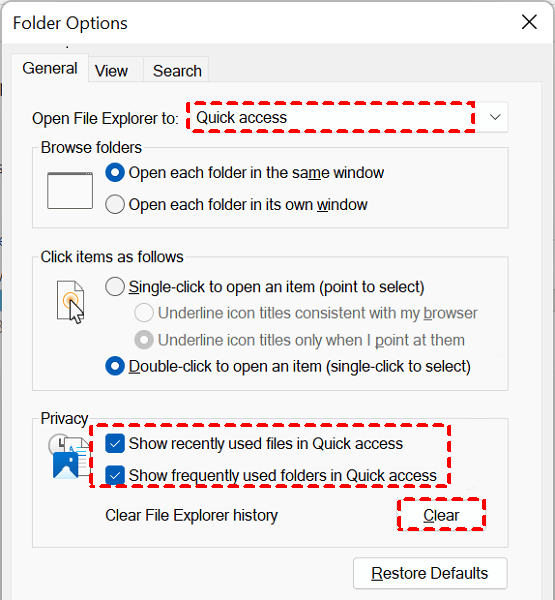If you meet Windows 11 Explorer slow loading, you can read this passage to know why is File Explorer so slow and use targeted methods to fix File Explorer loading slow.

Hello, everyone. I have been researching this issue for some time now, but none of the suggested fixes I have found and tried have made any difference. The problem is that when I open my downloads folder (located on my desktop) and fully populate all thumbnails, etc., it takes a few seconds, but afterward, the speed is EXTREMELY slow. Why is the File Explorer so slow? Is there any solution to solve that?
After using Windows 11 for a while, many users may have encountered various issues. This is expected as it is a new operating system still undergoing optimization, and it currently has certain flaws and problems. For example, File Explorer not responding and Windows 11 Explorer slow loading, are recently concerned issues. What are the causes? Here we collect several possible reasons:
° Hardware limitations
° Disk fragmentation
° Insufficient storage space
° Corrupted system files
° Outdated Windows updates
° Programs conflicts
Based on the listed reasons, we can employ common methods such as launching Task Manager or cleaning File Explorer cache files. If these prove to be ineffective, we can try to troubleshoot Windows search and indexing, extend drive space and defrag the system drive as targeted measures.
When you meet Windows 11 File Explorer slow loading, you don't have to close and reopen your folder windows to restart File Explorer. Your computer allows you to stop the Windows Explorer process and then start it again from the beginning. This can be helpful if File Explorer is not responding or acting slowly.
Step 1. Right-click the Start menu icon and select the Task Manager option.
Step 2. Then right-click Windows Explorer on the Task Manager window and select Restart.
When you restart File Explorer, it will open again automatically. Keep in mind that when you do this, not only File Explorer but also your taskbar and desktop may briefly disappear and then reappear. Or you can also restart your PC to give it a try.
File Explorer may not work correctly due to the large number of cache files it has accumulated. These files can make the program slow or unresponsive. To fix this issue, clearing the cache files in File Explorer is worth trying. This action removes the stored cache data and should resolve the problem you are experiencing.
Step 1. Run File Explorer and select the three dots at the top of the window and choose Options.
Step 2. Choose the Clear button next to Clear File Explorer history.

When Windows Search and Indexing encounter problems, they may affect the system's ability to quickly find and load files and data. By identifying and resolving these issues, you can improve the overall performance of your Windows 11 computer, making it faster and more responsive.
Step 1. Open the Windows 11 search and enter "Indexing options."
Step 2. Navigate to the Indexing Options and click on the Advanced button.
Step 3. Go to the Advanced Options and click on the Troubleshoot search and indexing link.
Step 4. Access the Search and Indexing troubleshooter, select the problem you are facing, and click on the Next button. Then, follow the instructions to complete the process.
When your computer's hard drive is nearly full, it affects virtual memory, leads to file fragmentation, and hampers caching, causing slow loading in Windows 11 File Explorer.
To fix this, AOMEI Partition Assistant Professional can offer several effective solutions. For example, you can try functions like allocating free space, PC Cleaner, or moving apps to another drive. Here we recommended you try the feature Allocate Free Space to solve the issue. It efficiently manages your hard drive by reallocating space to the system drive or the one with Windows, optimizing storage for faster File Explorer loading in Windows 11.
Step 1. Run AOMEI Partition Assistant, right-click a drive with much free space and click "Allocate Free Space".
Step 2. In the new window, you can specify the space size and target partition. If it’s C drive, you need to select C drive from the given list, and click “OK”.
Step 3. Click “Proceed” and “Apply” to execute.
After that, a part of the free space on the D drive will be added to the C drive.
If you use a hard drive, it may become severely fragmented, which means file data is scattered across the disk. This can lead to your CPU using extra processing power to search for and retrieve files from the disk, causing File Explorer to slow down when accessing certain files.
This issue was present in previous Windows versions and continues in Windows 11, as it relates to hard disk drives rather than the operating system. Fortunately, you can fix this problem by defragmenting your hard drive. AOMEI Partition Assistant can also help you with this task.
Step 1. Launch AOMEI Partition Assistant Professional, right-click on the disk you want to defragment, and select “Disk Defrag”.
Step 2. Tick the partition you want to defragment and click on “Analyze”. After the analysis is completed, the partition will be scored. Then, hit “Defrag” to start the defragmentation.
When the process is finished, you can close the tool.
Windows 11 Explorer slow loading can be fix in 5 ways in light of the causes. To make things easy and convenient, AOMEI Partition Assistant may be a suitable choice.
Except for using it to extend drive space and defrag the system drive, it can also migrate OS to SSD, clone disks, and create a bootable media, etc. If you want to run it on Windows Server 2003, 2008 (R2), 2012 (R2), 2016, 2019, 2022 and SBS 2003, 2008, 2011 computers, there is also the Server Edition can be chosen.